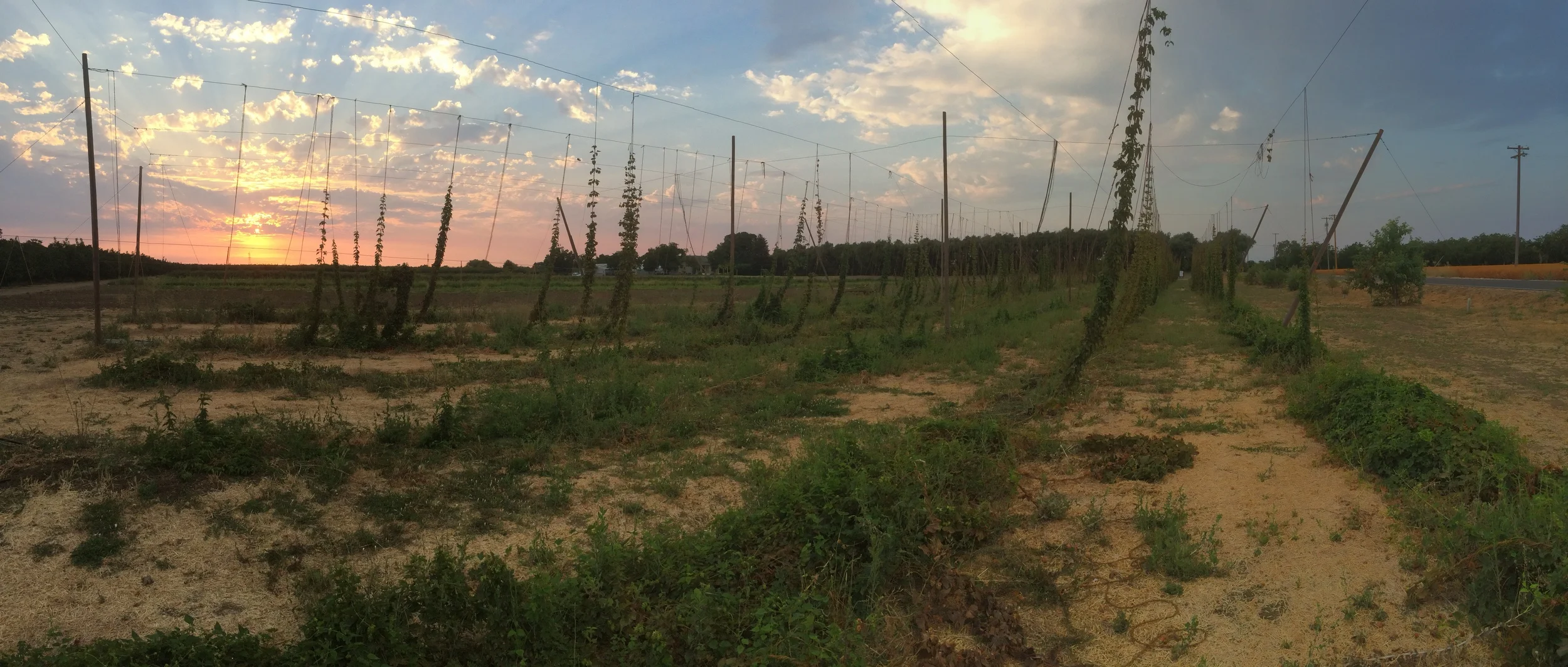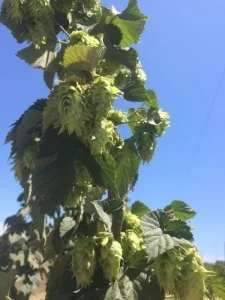PUTAH CREEK HOPS
This article is brought to you by the Yolo Microbrew Fest taking place on August 29th, 2015 at the Yolo County Fairgrounds!
I open my bleary eyes to darkness but instantly am fully alert when I remember what today is and how much there is to do. I look at the clock: 4 AM. I’ve coordinated with Brian Cofresi, Brewmaster at New Helvetia Brewing in Sacramento, to harvest while they brew and in this way provide the freshest hops possible.
I make coffee and go straight to the hop yard, located about 400 yards from Putah Creek near Winters, to meet the other hop pickers. It’s still dark but as I approach with my headlight on, I see the healthy, 16 ft bines.
We don our hop harvesting bags and get to work. It’s generally really fun to pick hops... for the first 15 minutes. It’s a unique and interesting experience-- finding pine-cone size hops topping the bines, crushing them in your hand to release the volatile oils and smelling the most beautiful aroma in the entire world- fresh humulus lupulus. But after 15 minutes you realize your bag is still awfully light and even though the hop cones are of monstrous proportion, they are fluffy and airy and it takes a long time to fill a 3 pound bag.
After 30 minutes your hands turn black from the resin and oils contained within the hops. But that’s a good sign-- it signals the hops are mature and full of lupulin- the golden yellow, pollen like substance contained within the hop. Lupulin is what breweries prize in the hops, containing the alpha and beta acids that give beer its characteristic bitterness and aroma. It is why IPAs, which contain as much as four times the average amount of hops, are generally bitter and some of the most aromatic beers found.
After 45 minutes, the picking gets tedious and your arms hurt from reaching above your head. To make matters even more difficult, hop bines have tiny hairs to help them climb, which scratch us just as if we ran through a thorny blackberry thicket. I imagine this allows the lupulin to penetrate into the blood better and wrack all sorts of beneficial havoc on my body. By hour 2 we are all quite loopy and we need to take a small break to refocus and get a breath of non-lupulin filled air.
By now, I imagine Brian the Brewer is over at New Helvetia unlocking the doors and getting ready to fire up the kettle. By 8 AM, the pickers have started to slow down but we are close to fulfilling the order- 18 lbs of Cascade, 16 lbs of Sterling, 14 lbs of Chinook and 10 lbs of Nugget. I know we need a morale boost to pick the last bit; so I open a New Helvetia “(916) Pale Ale”-- a beer made to celebrate the area’s emergence as a hop growing region. I’m trying to quit drinking before 9 AM, but I pour out small glasses for everybody and we toast- “Hops! Hops! Hops!” and with a surge of mysterious hop-picking energy, everybody shifts to the next gear and we finish picking 55 pounds of local, organically grown Putah Creek hops.
The hops fill my entire oversized van. It no doubt looks like a very large drug deal. (Note to police: When I am pulled over and inevitable but erroneously arrested, please be nice.) As I drive over the rice paddies between Davis and Sacramento to deliver the hops, I am happy knowing Putah Creek Hops provided a crucial ingredient for a locally grown, fresh hopped beer.
We take pride at Putah Creek Hops in providing local, organically grown hops to breweries in the Northern California region and as I heaved the 50 lbs of hops over my shoulder to carry into New Helvetia Brewing Co., I already look forward to fulfilling the next order. And in this way, do our part in helping to revitalize hop growing in the region and contribute to maintaining Sacramento as the beer capital of California.
Written by Patrick Martin at Putah Creek Hops



